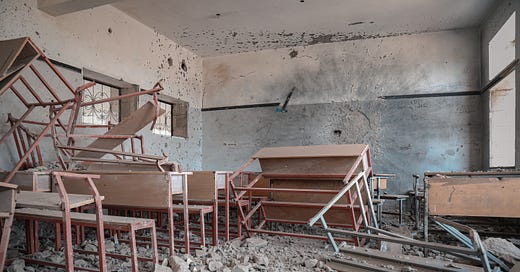Since the outbreak of the 2023 Israel-Hamas war, the Houthi have appeared in international headlines for firing missiles at Israeli cities and cargo ships. But as Abdulgaleel Ahmed’s essay this week in Public Seminar reminds us, the international community should not forget the consequences of Houthi rule within Yemen. Houthi attacks on schools and universities, Ahmed writes, have denied millions of children education and had a devastating impact on Yemeni academic freedom.
Silencing Teachers in Yemen
Abdulgaleel Ahmed
As the Houthi replaced the internationally recognized government of Yemen, dismissing it predictably as illegitimate and manipulated by Western forces, they dismantled the nation’s academic institutions, imposing a coercive educational regime with an ideologically-driven curriculum on instructors at every level, from primary schools to universities. Under Houthi rule, academic institutions began firing educators and university professors who tried to resist, denouncing them as hypocritical munafiqun (false Muslims). Students responded to this crackdown by abandoning their education and joining military campaigns to fight in the nation’s interminable civil war.
According to a 2022 UNICEF report, over 2,900 schools and universities in Yemen have totally been reduced to ruins. The few buildings still standing are now being used for purposes unrelated to education. Given these circumstances, UNICEF reports, approximately 2.4 million children, between 6 and 17 years old, have been deprived of access to education, and another 8.5 million are at risk of dropping out.
Meanwhile, the Houthi militia’s repressive regime has silenced scholars, stifled intellectual discourse, and infringed upon the fundamental principles of academic freedom. These were rights in theory enshrined by the first Constitution of the Republic of Yemen, adopted in 1999—but in practice repeatedly threatened by a succession of Yemeni governments, even before the Houthi seized power.




